Eric Schmitt
Mon, March 25, 2024
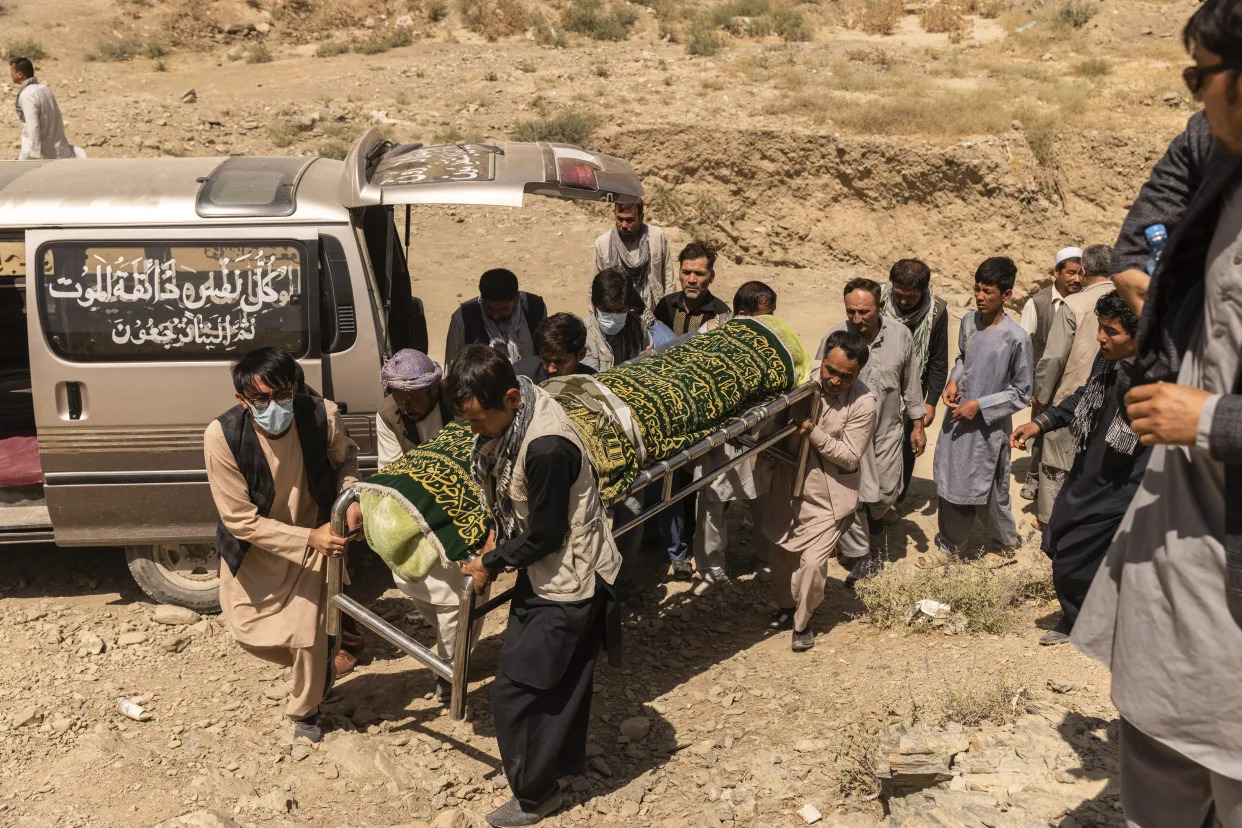
The funeral for a victim of the suicide attack at the international airport in Kabul in 2021 that was carried out by ISIS-K, in the hills outside of Kabul, Afghanistan on Aug. 27, 2021. (Victor J. Blue/The New York Times)
WASHINGTON — Five years ago this month, a U.S.-backed Kurdish and Arab militia ousted Islamic State group fighters from a village in eastern Syria, the group’s last sliver of territory.
Since then, the organization that once staked out a self-proclaimed caliphate across Iraq and Syria has metastasized into a more traditional terrorist group — a clandestine network of cells from West Africa to Southeast Asia engaged in guerrilla attacks, bombings and targeted assassinations.
None of the group’s affiliates have been as relentless as the Islamic State in Khorasan, which is active in Afghanistan, Pakistan and Iran and has set its sights on attacking Europe and beyond. U.S. officials say the group carried out the attack near Moscow on Friday, killing scores of people and wounding many others.
In January, Islamic State-Khorasan, or ISIS-K, carried out twin bombings in Iran that killed scores and wounded hundreds of others at a memorial service for Iran’s former top general, Qassem Soleimani, who was targeted in a U.S. drone strike four years earlier.
“The threat from ISIS,” Avril Haines, director of national intelligence, told a Senate panel this month, “remains a significant counterterrorism concern.” Most attacks “globally taken on by ISIS have actually occurred by parts of ISIS that are outside of Afghanistan,” she said.
Gen. Michael Kurilla, head of the military’s Central Command, told a House committee on Thursday that ISIS-K “retains the capability and the will to attack U.S. and Western interests abroad in as little as six months with little to no warning.”
U.S. counterterrorism specialists Sunday dismissed Russia’s suggestion that Ukraine was behind Friday’s attack near Moscow. “The modus operandi was classic ISIS,” said Bruce Hoffman, a terrorism scholar at the Council on Foreign Relations.
The assault was the third concert venue in the Northern Hemisphere that the Islamic State group has struck in the past decade, Hoffman said, after an attack on the Bataclan theater in Paris in November 2015 (as part of a broader operation that struck other targets in the city) and a suicide bombing at an Ariana Grande concert in Manchester Arena, England, in May 2017.
The Islamic State-Khorasan, founded in 2015 by disaffected members of the Pakistani Taliban, burst onto the international jihadi scene after the Taliban toppled the Afghan government in 2021. During the U.S. military withdrawal from the country, ISIS-K carried out a suicide bombing at the international airport in Kabul in August 2021 that killed 13 U.S. service members and as many as 170 civilians.
Since then, the Taliban have been fighting ISIS-K in Afghanistan. So far, the Taliban’s security services have prevented the group from seizing territory or recruiting large numbers of former Taliban fighters, according to U.S. counterterrorism officials.
But the upward arc and scope of ISIS-K’s attacks have increased in recent years, with cross-border strikes into Pakistan and a growing number of plots in Europe. Most of those European plots were thwarted, prompting Western intelligence assessments that the group might have reached the lethal limits of its capabilities.
In July, Germany and the Netherlands coordinated arrests targeting seven Tajik, Turkmen and Kyrgyz individuals linked to a ISIS-K network who were suspected of plotting attacks in Germany.
Three men were arrested in the German state of North Rhine-Westphalia over alleged plans to attack the Cologne Cathedral on New Year’s Eve 2023. The raids were linked to three other arrests in Austria and one in Germany on Dec. 24. The four people were reportedly acting in support of ISIS-K.
U.S. and other Western counterterrorism officials say these plots were organized by low-level operatives who were detected and thwarted relatively quickly.
“Thus far, ISIS-Khorasan has relied primarily on inexperienced operatives in Europe to try to advance attacks in its name,” Christine Abizaid, head of the National Counterterrorism Center, told a House committee in November.
But there are worrisome signs that ISIS-K is learning from its mistakes. In January, masked assailants attacked a Roman Catholic church in Istanbul, killing one person. Shortly afterward, the Islamic State group, through its official Amaq News Agency, claimed responsibility. Turkish law enforcement forces detained 47 people, most of them Central Asian nationals.
Since then, Turkish security forces have launched mass counteroperations against Islamic State group suspects in Turkey, Syria and Iraq. Several European investigations shed light on the global and interconnected nature of Islamic State group finances, according to a United Nations report in January, which identified Turkey as a logistical hub for ISIS-K operations in Europe.
The Moscow and Iran attacks demonstrated more sophistication, counterterrorism officials said, suggesting a greater level of planning and an ability to tap into local extremist networks.
“ISIS-K has been fixated on Russia for the past two years,” frequently criticizing President Vladimir Putin in its propaganda, said Colin Clarke, a counterterrorism analyst at the Soufan Group, a security consulting firm based in New York. “ISIS-K accuses the Kremlin of having Muslim blood in its hands, referencing Moscow’s interventions in Afghanistan, Chechnya and Syria.”
A significant portion of ISIS-K’s members are of Central Asian origin, and there is a large contingent of Central Asians living and working in Russia. Some of these individuals may have become radicalized and been in position to serve in a logistical function, stockpiling weapons, Clarke said.
Daniel Byman, a counterterrorism specialist at Georgetown University, said that “ISIS-K has gathered fighters from Central Asia and the Caucasus under its wing, and they may be responsible for the Moscow attack, either directly or via their own networks.”
Russian and Iranian authorities apparently did not take seriously enough public and more detailed private U.S. warnings of imminent ISIS-K attack plotting, or were distracted by other security challenges.
“In early March, the U.S. government shared information with Russia about a planned terrorist attack in Moscow,” Adrienne Watson, a spokesperson for the National Security Council, said Saturday. “We also issued a public advisory to Americans in Russia on March 7. ISIS bears sole responsibility for this attack. There was no Ukrainian involvement whatsoever.”
Russian authorities Saturday announced the arrest of several suspects in Friday’s attack. But senior U.S. officials said Sunday that they were still digging into the background of the assailants and trying to determine whether they were deployed from South or Central Asia for this specific attack or if they were already in the country as part of the network of supporters that ISIS-K then engaged and encouraged.
Counterterrorism specialists voiced concern Sunday that the attacks in Moscow and Iran might embolden ISIS-K to redouble its efforts to strike in Europe, particularly in France, Belgium, Britain and other countries that have been hit on and off for the past decade.
The U.N. report, using a different name for Islamic State Khorasan, said “some individuals of North Caucasus and Central Asian origin traveling from Afghanistan or Ukraine toward Europe represent an opportunity for ISIL-K, which seeks to project violent attacks in the West.” The report concluded that there was evidence of “current and unfinished operational plots on European soil conducted by ISIL-K.”
A senior Western intelligence official identified three main drivers that could inspire ISIS-K operatives to attack: the existence of dormant cells in Europe, images of the Israel-Hamas war in the Gaza Strip and support from Russian-speaking people living in Europe.
One major event this summer has many counterterrorism officials on edge.
“I worry about the Paris Olympics,” said Edmund Fitton-Brown, a former top U.N. counterterrorism official who is now a senior adviser to the Counter Extremism Project. “They would be a premium terrorist target.”
c.2024 The New York Times Company
IS-K: Who are the Islamic State jihadists behind Moscow attack?
Frank Gardner - BBC security correspondent
Mon, March 25, 2024
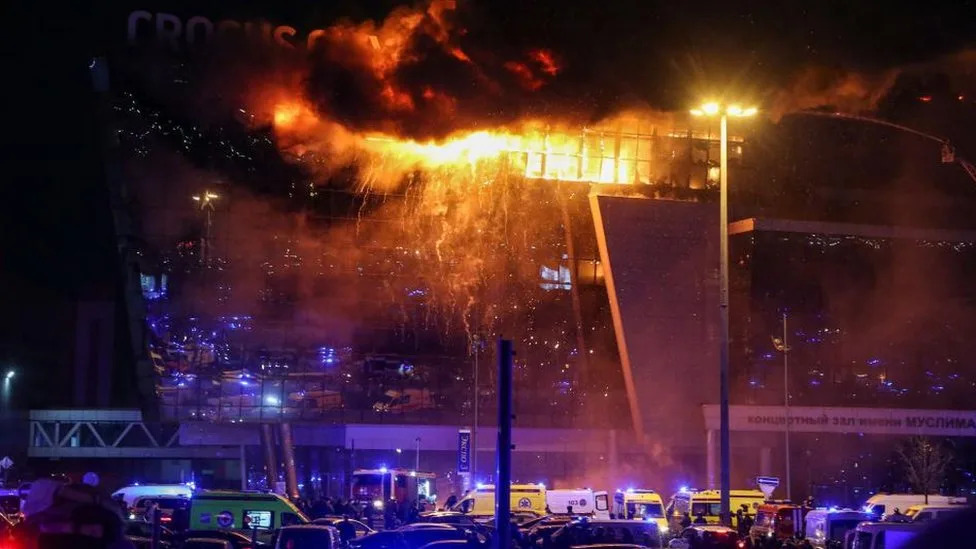
The Crocus City Hall in Moscow on fire
Despite attempts by President Vladimir Putin and Russia's state-controlled media to pin the blame for Friday's deadly Moscow theatre attack on Ukraine, more details are emerging about the jihadist group IS-K that has claimed it was behind it.
Who or what is IS-K?
IS-K is an abbreviation of Islamic State-Khorasan. It is a regional affiliate of the globally proscribed terror Islamic State group focused on Afghanistan, Iran and Pakistan.
The group has given itself the name Khorasan as that was part of an historic Islamic caliphate spanning those countries, as well as northward into Central Asia.
IS-K has been around for nine years but in recent months it has emerged as the most dangerous branch of the Islamic State group, with a long reach and a reputation for extreme brutality and cruelty.
Along with what is left of the group's wider leadership in Syria and Iraq, IS-K aspires to a pan-national Islamic caliphate ruled through an ultra-strict interpretation of Sharia, Islamic law.
In Afghanistan it is waging a sporadic but still deadly insurgency against the country's rulers, the Taliban, who it opposes on ideological grounds.
Has IS-K carried out attacks before?
It targeted the chaotic evacuation from Kabul airport in 2021 with a suicide bomb, killing 170 Afghans and 13 US servicemen.
The following year it targeted the Russian embassy in Kabul, killing at least six people and injuring others.
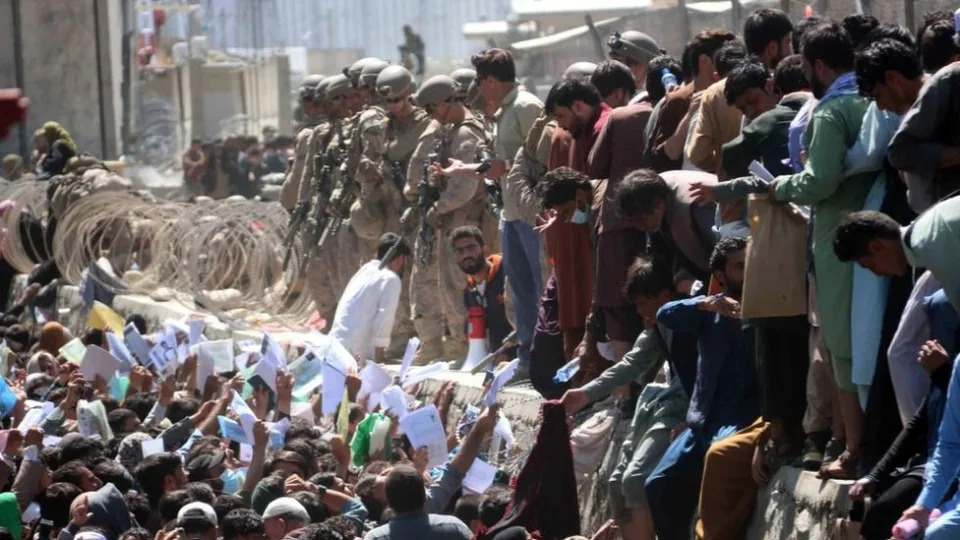
Dozens were killed when explosives were detonated among the crowd waiting to board evacuation planes leaving Kabul
The group has carried out indiscriminate attacks on a maternity ward, bus stations and policemen.
In January this year, IS-K carried out a double bombing of a shrine in Kerman, Iran, killing nearly 100 Iranians.
In Russia it has carried out numerous small-scale attacks, the most recent being in 2020 - and already this year the FSB, Russia's internal security service, says it has stopped several terror plots.
Who were the attackers?
According to Russian state media the four men captured and charged are all Tajiks from the Central Asian republic of Tajikistan, which used to be part of the Soviet Union.
It is obvious from their battered and bruised appearance in court that they have been especially harshly interrogated to the point of torture.
The problem with that is according to international norms, their confessions will be worthless - people will say anything to make the pain stop, including confessing to a narrative that is simply untrue.
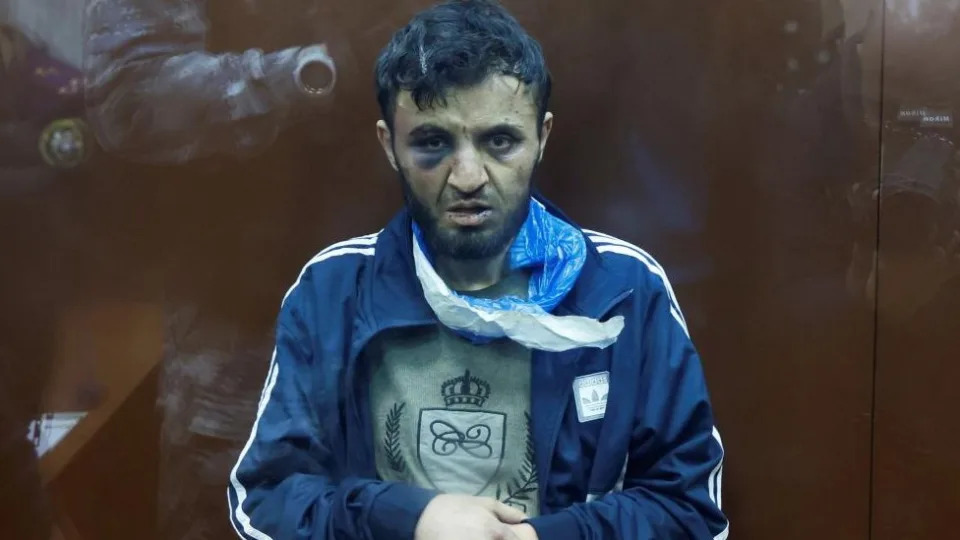
Dalerdzhon Mirzoyev, one of the suspects, appeared in court with visible injuries
Reports have emerged that one of the men was seen carrying out surveillance of the venue in early March, around the time the US warned Russia there was an imminent threat of a terrorist attack on a public space - a warning the Kremlin dismissed at the time as "propaganda".
Another report says at least two of the attackers arrived in Russia recently, implying that this was a "hit team" sent by IS-K, rather than a sleeper cell of residents.
Why did they target Russia?
There are several reasons.
IS-K consider most of the world to be their enemies. Russia is high up on their list, along with the US, Europe, Israel, Jews, Christians, Shia Muslims, the Taliban and all rulers of Muslim-majority states, who they consider to be "apostates".
Islamic State's hostility to Russia goes back to the Chechen wars in the 1990s and early 2000s, when Moscow's forces devastated the Chechen capital Grozny.
More recently, Russia entered the Syrian civil war on the side of its ally, President Bashar al-Assad, and the Russian air force has carried out countless bombings of rebel and civilian positions, killing large numbers of Islamic State group and Al-Qaeda-linked fighters.
In Afghanistan, IS-K view Russia as being an ally of the Taliban, which is why they attacked the Russian embassy in Kabul in 2022.
Moscow attack: Debunking the false claims
Steve Rosenberg: As Russia mourns, how will Putin react?
Bullets and panic - the Moscow concert that became a massacre
They also bear a grudge for the 10 years of brutal Soviet occupation of that country from 1979-89.
Then there is the situation inside Russia itself.
Russia is viewed by IS-K as very much a Christian country and their video posted after the Moscow attack talks about killing Christians.
Tajik and other Central Asian migrant workers are sometimes subject to a degree of harassment and suspicion by the FSB as it seeks to head off terrorist attacks.
Finally, Russia - a nation currently distracted by its full-scale war with its neighbour Ukraine - may simply have been a convenient target of opportunity for IS-K, a place where weapons were available and their enemy's guard was down.
What do we still not know?
There remain a number of unanswered questions about this whole episode.
For example, why were the attackers able to wander at will for nearly an hour around the Crocus Hall with absolutely no apparent sense of urgency?
In a country where the police and special services, notably the FSB, are omnipresent, these gunmen behaved as if they knew they were not going to be interrupted by a police SWAT team.
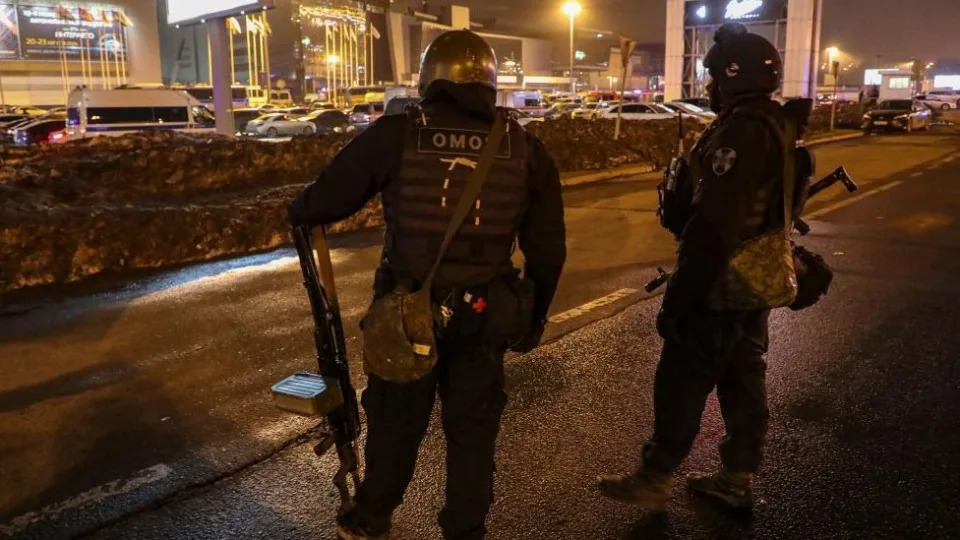
Russia's extensive security services were not able to stop the attack
Then there are the weapons - not just handguns but powerful, modern automatic assault rifles. How were they able to acquire these and smuggle them undetected into the venue?
Their swift capture is also surprising.
Unlike many jihadist gunmen on a raid like this, these men were not wearing suicide vests or belts, in the manner of those who prefer death to capture.
And yet, it did not take long for the Russian authorities - the same Russian authorities who failed to stop the worst terror plot in 20 years unfolding beneath their noses - to round up the suspects and put them on trial.
All this is prompting some analysts to speculate about some sort of so-called "inside job" by the Kremlin, or a "false flag operation" to garner popular support for the war on Ukraine.
However, there is no hard evidence to support that theory and US intelligence has confirmed that in their view, it was Islamic State behind this hideous attack.
Why ISIS-K Hates Putin—and Went After Moscow
Fred Kaplan
SLATE
Mon, March 25, 2024
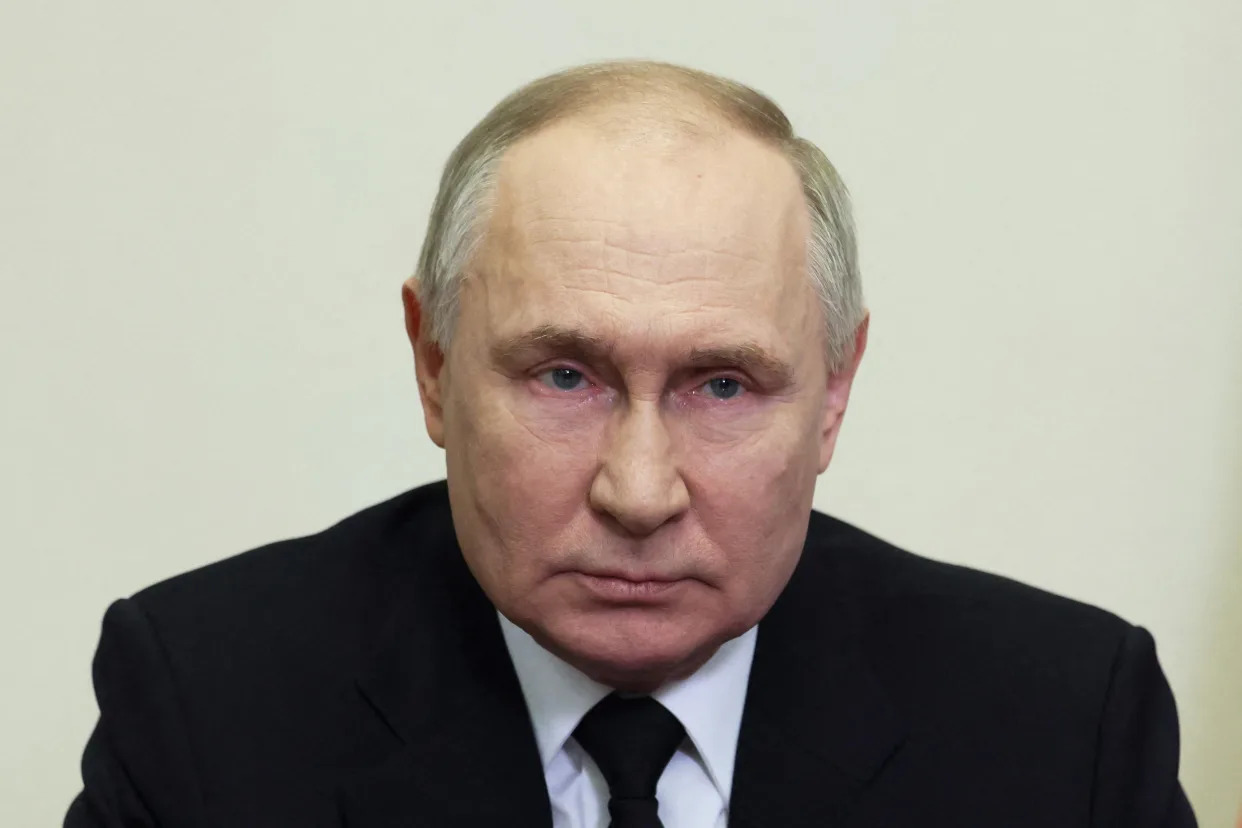
It should have been no surprise that the terrorist group known as ISIS was behind Friday night’s massive attack on a concert hall in Moscow, killing 137 people and injuring at least 100.
The surprise is that this sort of thing doesn’t happen more often.
ISIS, also called the Islamic State, was believed dead and gone in 2017, after U.S., Iraqi, and Kurdish forces defeated its final holdout of armed men in a ferocious battle around the Iraqi town of Mosul. The terrorist group—which, for the previous few years, had ruled as many as 12 million people in a self-declared “caliphate” spanning much of northwestern Iraq and eastern Syria—was obliterated as a political and military power, but a few thousand of its fanatics survived.
Many Western articles and analyses painted ISIS as an especially violent offshoot of al-Qaida bent on wiping out or overthrowing territories held by “apostates” of all sorts—Christians, Jews, and rival Shiite Muslims. But the group also singled out Russia as a particularly virulent enemy.
Since the fall of 2015, Russian President Vladimir Putin has been helping Syrian President Bashar al-Assad fight off all opposition factions in a gruesome civil war, sending him not just bombs and ammo but fighter planes flown by Russian air force pilots. ISIS fighters have been among the targets of these bombing raids—and they have sought revenge.
Bruce Hoffman, a counterterrorism expert at the Council on Foreign Relations, told me Monday that since the caliphate’s collapse in Mosul, many ISIS survivors have been animated most of all by the crusade against Russia.
Not long after Putin began his deployment, ISIS militants in Egypt claimed responsibility for planting a bomb on a charter flight to St. Petersburg, killing 224 passengers, all of them Russian tourists returning home. In 2017 an ISIS suicide bomber blew up a subway car in the St. Petersburg metro system, killing 16.
The metro bomber was from Kyrgyzstan, one of the former Soviet Union’s Central Asian republics. The four men arrested after this past Friday’s concert-hall killings were from Tajikistan, another former republic in the same region. The fact is no coincidence. The majority of this region’s citizens are Muslim. Many of them resent Russia for its tyrannical grip from Soviet times (animated, in the case of its hold over Muslim areas, by white-nationalist racism). Some residents of these countries have been further radicalized by Islamist terrorist groups, which flourished with the rise of al-Qaida and ISIS. And according to Hoffman, many of those who were radicalized and who had been recruited to fight for the caliphate fled back home just before or after the fall of Mosul.
The concert-hall killing in Moscow was planned and carried out by a branch of the terrorist movement called ISIS-K. (The K stands for the Khorasan region, which overlaps parts of Afghanistan, Pakistan, Iran, and Turkmenistan.) ISIS-K has been fighting the Taliban in Afghanistan; it regards the Taliban leaders, who took over Afghanistan in 2017 after U.S. forces withdrew and the Kabul government collapsed, as insufficiently militant.
Still, the group has stepped up terrorist activities outside its home area.
In January, two ISIS-K suicide bombers killed 84 Iranian Shiites who were attending a memorial service for Qassem Soleimani, the leader of Iran’s terrorist operations throughout the Middle East, on the fourth anniversary of his assassination. The success of that attack might have encouraged the Moscow attack a little over two months later.
In the first decade of this century, after the Soviet collapse and its own withdrawal from an earlier war in Afghanistan, the Kremlin was very concerned about the rise of radical Islam in the Central Asian republics. For that reason, even Putin, for a while anyway, was keen to help the United States after the Sept. 11 terrorist attacks—sharing intelligence about al-Qaida and urging Central Asian leaders to let the U.S. military use their airfields to service and resupply our own invasion of Afghanistan.
However, after Putin’s annexation of Crimea in 2014 and especially since Russia’s outright invasion of Ukraine in 2022, contacts between Washington and Moscow have broken off.
Twice this month, in accordance with a long-standing policy known as “duty to warn,” U.S. intelligence officials notified their Russian counterparts of a report that ISIS-K was planning a terrorist attack in Russia. Putin waved away the warning as “an attempt to frighten and destabilize our society.”
By coincidence, shortly after the Americans’ first warning, Russia’s Federal Security Service stopped an impending attack on a Moscow synagogue. It is possible that Putin or his aides thought that this was the attack in the U.S. duty-to-warn notice (which, in any case, did not contain any details about when or where a terrorist strike might take place).
Russian intelligence and security forces were probably also shorthanded, as the vast majority of them have been diverted to—or distracted by—the war in Ukraine. Large concert halls are particularly ripe targets—and the Crocus City Hall in Krasnogorsk, the northwestern district of Moscow where this attack took place, is a vast mall that includes a hotel, restaurants, and a few music venues. It would be very difficult for even the most fully staffed and scrupulous security team to check every person and every bag entering its main doors.
Nonetheless, it was clear Putin was caught off guard. He remained silent for several hours after the attack. When he finally emerged, he spoke on a televised broadcast for a mere five minutes, made no mention of ISIS, and came close to blaming the incident on Ukraine. First, he likened the perpetrators to “Nazis,” a term he often uses to describe the officials in Kyiv. Second, he said that, whoever they were, they were fleeing toward Ukraine, where they would be received with open arms. (Ukraine denies any involvement in the attack. ISIS-K has openly claimed responsibility.)
It is not known whether the four men arrested were the only ones who took part in the attack—or even whether all four of these men actually did. After confessing to the crime, they appeared in Russian court in a clearly beaten state, some with bruises and swollen faces, one sitting unconscious in a wheelchair.
Will the attack damage Putin politically? Some think so. It is the deadliest terrorist attack in Russia in 20 years. Many Russians have ceded to Putin’s domestic oppression, even to his war, reasoning that at least he has kept the country safe and strong. The concert-hall attack delivers a sucker punch to that notion—especially when viewed alongside a spate of attacks on Russian oil refineries, railway depots, and other high-profile targets, launched either by Ukrainians who surreptitiously crossed the border or by Russian saboteurs.
Then again, Putin has survived a plethora of plots, threats, and horrid situations that would have knocked many other dictators out of power or worse. He may survive this one as well, and may even exploit it—as he has done in the wake of terrorist attacks in the past—to intensify his campaigns against enemies domestic and foreign, imagined and real.
Putin’s grip on power is at once tenacious and vulnerable, just as Russia itself acts at times like a rapacious empire and, at others, like a ramshackle cogwheel spinning out of control and about to implode. The combination—when it comes to both the man and his fiefdom—can be dangerous.
What is ISIS-K, the group claiming the Moscow concert attack?
Mon, March 25, 2024

It should have been no surprise that the terrorist group known as ISIS was behind Friday night’s massive attack on a concert hall in Moscow, killing 137 people and injuring at least 100.
The surprise is that this sort of thing doesn’t happen more often.
ISIS, also called the Islamic State, was believed dead and gone in 2017, after U.S., Iraqi, and Kurdish forces defeated its final holdout of armed men in a ferocious battle around the Iraqi town of Mosul. The terrorist group—which, for the previous few years, had ruled as many as 12 million people in a self-declared “caliphate” spanning much of northwestern Iraq and eastern Syria—was obliterated as a political and military power, but a few thousand of its fanatics survived.
Many Western articles and analyses painted ISIS as an especially violent offshoot of al-Qaida bent on wiping out or overthrowing territories held by “apostates” of all sorts—Christians, Jews, and rival Shiite Muslims. But the group also singled out Russia as a particularly virulent enemy.
Since the fall of 2015, Russian President Vladimir Putin has been helping Syrian President Bashar al-Assad fight off all opposition factions in a gruesome civil war, sending him not just bombs and ammo but fighter planes flown by Russian air force pilots. ISIS fighters have been among the targets of these bombing raids—and they have sought revenge.
Bruce Hoffman, a counterterrorism expert at the Council on Foreign Relations, told me Monday that since the caliphate’s collapse in Mosul, many ISIS survivors have been animated most of all by the crusade against Russia.
Not long after Putin began his deployment, ISIS militants in Egypt claimed responsibility for planting a bomb on a charter flight to St. Petersburg, killing 224 passengers, all of them Russian tourists returning home. In 2017 an ISIS suicide bomber blew up a subway car in the St. Petersburg metro system, killing 16.
The metro bomber was from Kyrgyzstan, one of the former Soviet Union’s Central Asian republics. The four men arrested after this past Friday’s concert-hall killings were from Tajikistan, another former republic in the same region. The fact is no coincidence. The majority of this region’s citizens are Muslim. Many of them resent Russia for its tyrannical grip from Soviet times (animated, in the case of its hold over Muslim areas, by white-nationalist racism). Some residents of these countries have been further radicalized by Islamist terrorist groups, which flourished with the rise of al-Qaida and ISIS. And according to Hoffman, many of those who were radicalized and who had been recruited to fight for the caliphate fled back home just before or after the fall of Mosul.
The concert-hall killing in Moscow was planned and carried out by a branch of the terrorist movement called ISIS-K. (The K stands for the Khorasan region, which overlaps parts of Afghanistan, Pakistan, Iran, and Turkmenistan.) ISIS-K has been fighting the Taliban in Afghanistan; it regards the Taliban leaders, who took over Afghanistan in 2017 after U.S. forces withdrew and the Kabul government collapsed, as insufficiently militant.
Still, the group has stepped up terrorist activities outside its home area.
In January, two ISIS-K suicide bombers killed 84 Iranian Shiites who were attending a memorial service for Qassem Soleimani, the leader of Iran’s terrorist operations throughout the Middle East, on the fourth anniversary of his assassination. The success of that attack might have encouraged the Moscow attack a little over two months later.
In the first decade of this century, after the Soviet collapse and its own withdrawal from an earlier war in Afghanistan, the Kremlin was very concerned about the rise of radical Islam in the Central Asian republics. For that reason, even Putin, for a while anyway, was keen to help the United States after the Sept. 11 terrorist attacks—sharing intelligence about al-Qaida and urging Central Asian leaders to let the U.S. military use their airfields to service and resupply our own invasion of Afghanistan.
However, after Putin’s annexation of Crimea in 2014 and especially since Russia’s outright invasion of Ukraine in 2022, contacts between Washington and Moscow have broken off.
Twice this month, in accordance with a long-standing policy known as “duty to warn,” U.S. intelligence officials notified their Russian counterparts of a report that ISIS-K was planning a terrorist attack in Russia. Putin waved away the warning as “an attempt to frighten and destabilize our society.”
By coincidence, shortly after the Americans’ first warning, Russia’s Federal Security Service stopped an impending attack on a Moscow synagogue. It is possible that Putin or his aides thought that this was the attack in the U.S. duty-to-warn notice (which, in any case, did not contain any details about when or where a terrorist strike might take place).
Russian intelligence and security forces were probably also shorthanded, as the vast majority of them have been diverted to—or distracted by—the war in Ukraine. Large concert halls are particularly ripe targets—and the Crocus City Hall in Krasnogorsk, the northwestern district of Moscow where this attack took place, is a vast mall that includes a hotel, restaurants, and a few music venues. It would be very difficult for even the most fully staffed and scrupulous security team to check every person and every bag entering its main doors.
Nonetheless, it was clear Putin was caught off guard. He remained silent for several hours after the attack. When he finally emerged, he spoke on a televised broadcast for a mere five minutes, made no mention of ISIS, and came close to blaming the incident on Ukraine. First, he likened the perpetrators to “Nazis,” a term he often uses to describe the officials in Kyiv. Second, he said that, whoever they were, they were fleeing toward Ukraine, where they would be received with open arms. (Ukraine denies any involvement in the attack. ISIS-K has openly claimed responsibility.)
It is not known whether the four men arrested were the only ones who took part in the attack—or even whether all four of these men actually did. After confessing to the crime, they appeared in Russian court in a clearly beaten state, some with bruises and swollen faces, one sitting unconscious in a wheelchair.
Will the attack damage Putin politically? Some think so. It is the deadliest terrorist attack in Russia in 20 years. Many Russians have ceded to Putin’s domestic oppression, even to his war, reasoning that at least he has kept the country safe and strong. The concert-hall attack delivers a sucker punch to that notion—especially when viewed alongside a spate of attacks on Russian oil refineries, railway depots, and other high-profile targets, launched either by Ukrainians who surreptitiously crossed the border or by Russian saboteurs.
Then again, Putin has survived a plethora of plots, threats, and horrid situations that would have knocked many other dictators out of power or worse. He may survive this one as well, and may even exploit it—as he has done in the wake of terrorist attacks in the past—to intensify his campaigns against enemies domestic and foreign, imagined and real.
Putin’s grip on power is at once tenacious and vulnerable, just as Russia itself acts at times like a rapacious empire and, at others, like a ramshackle cogwheel spinning out of control and about to implode. The combination—when it comes to both the man and his fiefdom—can be dangerous.
What is ISIS-K, the group claiming the Moscow concert attack?
Reuters Videos
Updated Mon, March 25, 2024
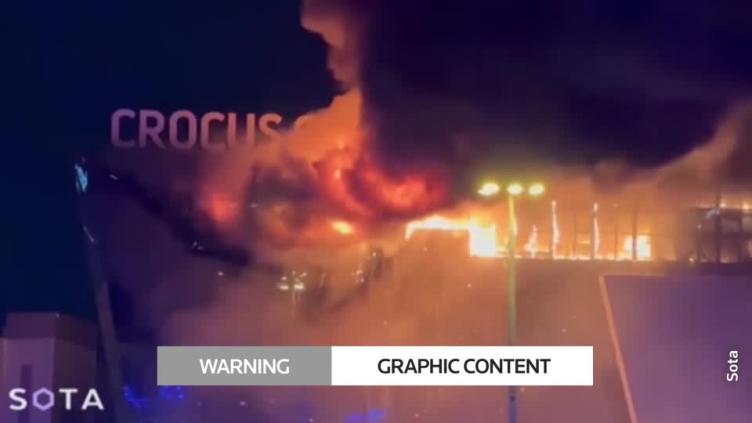
STORY: On March 22, armed men burst into this concert hall near Moscow, killing at least 137 people and wounding more than 180 in one the deadliest attacks in Russia.
ISIS-K – the Afghan branch of Islamic State militant group – says it was behind the attack.
Russia has cast doubts over claim, while the United States says it has intelligence confirming it.
Here’s what we know about ISIS-K, and their motives for attacking Russia.
Islamic State Khorasan - or ISIS-K - is named after an old term for the region that included parts of Afghanistan, Iran and Turkmenistan.
The group emerged in eastern Afghanistan in late 2014 and quickly established a reputation for extreme brutality.
Its leader, 29-year-old Sanaullah Ghafari, has overseen its transformation into one of the most fearsome branches of the global Islamist network.
ISIS-K has a history of attacks inside and outside Afghanistan.
In 2021, it grabbed global attention with a suicide bombing on Kabul international airport during the U.S. military withdrawal.
The attack killed 13 U.S. soldiers and scores of civilians.
In September 2022, it claimed responsibility for a deadly suicide attack at the Russian embassy in Kabul.
(John Kirby, U.S. National Security spokesperson)
“ISIS-K does remain a viable terrorist threat.”
Perhaps its most brazen operation to date came in January 2024,
with twin bombings that killed nearly 100 people in Iran.
Senior fellow at the Center for Strategic and International Studies Dan Byman:
"ISIS-K has several thousand fighters, is the general estimate, and it was largely believed to be more of a guerrilla group that did the occasional terrorist attack, but largely focused on Afghanistan. However, recently there were also some plots that European intelligence claims still disrupted, so they seem to be shifting from being a regional group to doing more attacks further afield, whether it's in Moscow or in Europe."
Security experts say ISIS-K has been fixated on Russia for the past two years.
The group criticizes Russian President Vladimir Putin for changing the course of the Syrian civil war by supporting President Bashar al-Assad against Islamic State.
ISIS-K has also been aggressively recruiting ethnic Tajiks and Uzbeks across Central Asia,
who have their own grievances against Moscow.
"So, Russia is a long-standing enemy of the broader jihadist community if you go way back to the, of course, the struggle in Afghanistan against the Soviet Union. Fast forward a bit and Russia, of course, backed Syria during the civil war and the Islamic State was on the other side of that. So, Russia is seen as working with Syria, fighting Muslims and the caucuses in Central Asia. So, both the group in particular, but also the broader community are very anti-Russian."
The Islamic State's Moscow Massacre
Liz Wolfe
Mon, March 25, 2024
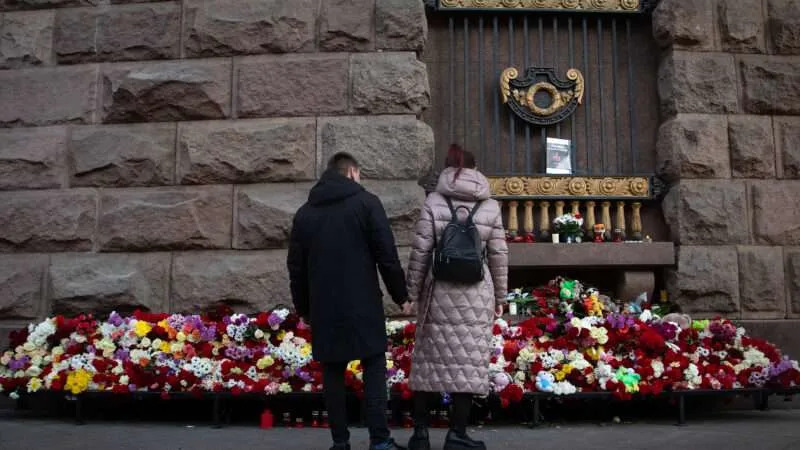
A couple mourns at a spontaneous memorial to the victims of the terrorist attack at Crocus City Hall, organized at the entrance to the Tekhnologichesky Institute metro station in St. Petersburg. | Artem Priakhin/SOPA Images/Sipa USA/Newscom
137 dead: Over the weekend, gunmen affiliated with Islamic State Khorasan (ISIS-K)—an offshoot founded in 2015, mostly comprised of malcontent Taliban militants—opened fire on a Moscow concert hall where the band Picnic was playing. They killed 137 people and injured 180 more, and they also set the concert hall on fire. The Islamic State claimed responsibility for the attack; Russian news media immediately started blaming Ukraine, claiming the West was lying about who is responsible.
The four suspects, who have been arrested, are men from Tajikistan who were in Russia as migrant workers. Russian President Vladimir Putin alleged the men "were heading toward Ukraine" to seek refuge after carrying out their attack.
"During the U.S. military withdrawal from the country, ISIS-K carried out a suicide bombing at the international airport in Kabul in August 2021 that killed 13 U.S. service members and as many as 170 civilians," reports The New York Times. ISIS-K has, up until now, been widely regarded as ineffective; the group has plotted several attacks in Europe—notably one on the cathedral in Köln, Germany, for New Years Eve 2023—yet has mostly been thwarted before they've had the opportunity to carry them out.
Trump goes to court (again): Former President Donald Trump will appear in a Manhattan court today to "seek another delay of his criminal trial on charges that he covered up a sex scandal that could have derailed his stunning victory in the 2016 presidential election," per The New York Times.
There was a recent delay in this case, after new evidence was made available and the judge decided that Trump's lawyers needed a 30-day extension to review it. (Trump asked for either a 90-day extension or a thrown-out case.)
But Trump is also facing imminent financial trouble, from needing to either settle up in the civil fraud case—also in New York—or go the appeals route, which would require him to secure a half-billion-dollar bond. If Trump does not secure that bond, the state attorney general, Letitia James, will most likely start freezing Trump's bank accounts and seizing some of his assets. (He already secured a $91.6 million bond needed for another case—the defamation suit brought by E. Jean Carroll—but is struggling to do so for this much larger amount.)
Appeal bonds, like the one Trump is seeking, are "document[s] in which a company guarantees the. judgment, plus interest, should [a client] lose his appeal and fail to pay," says the Times. "Mr. Trump would need to pledge significant collateral to a bond company—about $557 million, his lawyers said—including as much cash as possible, as well as stocks and bonds he could sell quickly." He would also incur a roughly $20 million fee owed to the bond company.
Why is Islamic State targeting Russia?
Elliott Goat, The Week UK
Mon, March 25, 2024

Illustration of a shooting target in the colours of the Russian flag, partially burnt and marked with bullet holes.
Opportunity as well as ideology is likely to have led Islamic State's Afghan off-shoot to select Moscow as the target for Friday's deadly terror attack, experts say.
Despite an immediate claim of responsibility from IS, Vladimir Putin has sought to deflect blame to Ukraine for the attack at the Crocus City Hall music venue that left at least 137 people dead and hundreds more injured.
But "from the outset", said Gavin Mortimer in The Spectator, it was "obvious to seasoned observers" who was behind the massacre. The attackers "cleaved to the same ideology as those who have this century murdered thousands of innocent men, women and children in New York, Bali, Madrid, London, Brussels, Paris, Manchester and Nice".
And with Russia's security services distracted by the Ukraine conflict and domestic opposition to the war, the Islamists seized the chance to target Moscow.
What did the commentators say?
Islamic State Khorasan Province (IS-K) is the branch of IS that has "most consistently and energetically" attempted terrorist attacks across Europe, including in Russia, said Greg Barton, chair of global Islamic politics at Deakin University in Melbourne, on The Conversation.
Both IS in general and IS-K in particular have a long list of grievances against Russia. They cite the Soviet Union's occupation of Afghanistan in the 1980s; a crackdown on Muslim minorities in the North Caucasus; Russia's wars in Chechnya; and the crucial role Moscow played in propping up Bashar al-Assad's regime during Syria's decade-long civil war.
Russia is of "particular interest" to IS and is "targeted because it claims President Vladimir Putin and his regime are killing Muslims", said Sky News.
The Nord Ost theatre siege in 2002 and the Beslan massacre in 2004 were the most notorious attacks by Islamist groups inside Russia, and the threat of another large-scale incident had been growing in recent years.
The FSB, Russia's security service, announced earlier this month that it had foiled an attack by IS-K on a synagogue in Kaluga, southwest of Moscow. The US embassy in Russia subsequently warned that it was "monitoring reports that extremists have imminent plans to target large gatherings in Moscow, to include concerts".
But it was also "likely opportunity and personnel that led the group to select a soft target in Moscow", said Barton on The Conversation. The majority of IS-K militants arrested across Europe, including in Russia, over the past two years have been Russian nationals or people from Central Asia with links to Russia.
IS-K "has even rolled out a Russian-language propaganda wing", Lucas Webber, co-founder of MilitantWire, which produces analysis of militant activity, told the Financial Times (FT). "It has placed heavy focus on inciting supporters to carry out attacks against Russia."
Vera Mironova, an associate fellow at the Davis Center at Harvard University, said the group chose Moscow possibly because it was relatively easy, in contrast to planned attacks in other European countries that have been foiled in recent months. "It's about the convenience of the target," she told the FT.
The group will have hoped to "sow chaos in Russia at a time when it is fighting a war in Ukraine", said Sky News. The attack puts the spotlight back on Russia's security services, and on Putin's promise to deliver "peace and stability" following his election for a fifth term.
The FSB had previously "focused almost entirely on the Islamist terror threat", said the FT, but since 2022 the agency has "shifted its focus" to Ukraine. Those it has accused of "terrorism" have predominantly been Russians protesting against the war, according to an analysis of official statements by the independent Novaya Gazeta Europe newspaper.
What next?
Like all terror groups, IS-K's "grand design is to push people to extremes and to try to elicit an overreaction and overreach", said Sky News.
In the short term, the attack will raise the profile of the group outside central Asia and broaden its recruitment pool.
Putin's response will depend on whether he and his propagandists in the media continue to try to maintain that Ukraine was involved, or instead pivot to accept IS-K's responsibility.
Either way, said Barton, the Kremlin is "likely to respond with a wave of violence, cracking down on Russia's Muslim minority communities in the North Caucasus region and beyond". Friday night's attack in Moscow was "nightmarish", but "sadly the horror is likely to be just the beginning".
No comments:
Post a Comment